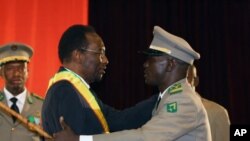A transitional president was sworn in Thursday in Mali -- a critical step in restoring civilian rule.
But much remains to be done, including naming a consensus prime minister and defining the future role of the military junta that seized power last month.
During the swearing-in ceremony on Thursday, the moment that drew the most robust cheers and applause was when junta leader Captain Amadou Sanogo stepped onto the stage and saluted and embraced interim president Dioncounda Traoré.
Sanogo last week signed an accord with the regional bloc ECOWAS for a transition to civilian rule. Under the agreement the interim president will be in power for a maximum of 40 days. But the accord is ambiguous on the future role of the junta.
Junta members and political leaders are due to travel to Burkina Faso this weekend to flesh out some points in the agreement.
But on Monday Sanogo raised some eyebrows in remarks to local journalists.
Referring to the junta's name, the National Committee for the Recovery of Democracy and Restoration of the state, Sanogo declared the committee is "here, it remains here and will continue to work on the transition." After the 40-day period, the junta and ECOWAS -- the two parties to the accord -- will take up the rest of the transition, he said.
Gilles Yabi, who heads the International Crisis Group in West Africa, said the remarks indicate that Sanogo sees the junta as retaining influence going forward. He said it would be wrong to think that the junta will have no lasting consequences for the transition.
Most Malians VOA has spoken with say that while no country wants to see a coup d’état, the military takeover on March 22 handed Mali a chance to end years of corruption and bad governance. For the past two months, citizens have expressed disgust at how the army was being routed out by Tuareg rebels in city after city in the north since the latest rebellion broke in January.
In that sense, many Malians say they listen when Sanogo says the military waged the coup for the good of Mali.
Crisis Group’s Yabi said that given the loss of credibility in the military hierarchy, it will not be easy to completely marginalize Sanogo and the junta.
Members of a political front in Mali, who early on came out against the coup d’état, said they did not want to talk about Sanogo’s remarks on the record. The said they wanted to avoid a public argument over that and just continue working on the specifics of the accord.
During his inaugural speech, interim President Dioncounda Traoré thanked the junta and the Malian army, triggering cheers and applause from the hundreds gathered for the swearing-in ceremony.
He praised the junta for its patriotism in accepting a return to civilian rule, saying it proves its actions stemmed from a commitment to Mali, and that the junta puts the country above all else.




